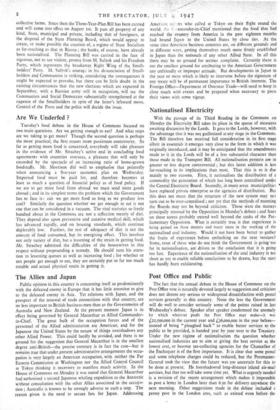Nationalised Electricity
With the passage of its Third Reading in the Commons_ on Monday the Electricity Bill takes its place in the queue of measures awaiting discussion by the Lords. It goes to the Lords, however, with the advantage that it was not guillotined at any stage in the Commons. The Bill therefore has received full consideration in its first stage albeit in essentials it emerges very close to the form in which it was originally introduced,.and it may be anticipated that the amendments made to it in the Lords will be of a less substantial character than those made in the Transport Bill. All nationalisation projects are in greater or less degree controversial ; but this latest addition is less far-reaching in its implications than most. That this is so is due mainly to two reasons.. First, it nationalises the distribution of a commodity the generation of which has long been centralised under the Central Electricity Board. Secondly, in many areas municipalities • have replaced private enterprise as the agencies of distribution. But this does not mean that the structure of the new system may not turn out to be over-centralised ; nor yet that the methods of manning the Boards may not be beyond criticism. These were the matters principally stressed by the Opposition in Monday's debate ; and fears on these scores probably extend well beyond the ranks of the Par- liamentary Opposition. What is certainly true is that experience is being gained on these matters and many more in the working of the nationalised coal industry. Would it not have been better to gather the fruits of experience before embarking on the next venture? Some, even of those who do not think the Government is going-too far in nationalisation, are driven to the conclusion that it is going too fast. Experience of the nationalisation of the coal industry is too short as yet to enable reliable conclusions to be drawn, but' the start has hardly been exhilarating.






































 Previous page
Previous page